小学六年级英语上册期末复习
小学英语六年级上学期期末考试复习卷

小学英语六年级上学期期末考试复习卷一、找出划线部分发音不同的那一项(4分)1.找出划线部分发音不同的那一项()A. greatB. feelC. greenD. feature2.找出划线部分发音不同的那一项()A. knowB. brownC. soundD. count3.找出划线部分发音不同的那一项()A. schoolB. stuckC. MunichD. chase4.找出划线部分发音不同的那一项()A. comicB. comeC. OctoberD. honest二、根据首字母及上下文的提示,填写单词,使句子通顺、合理。
(7分)5.S________ down, please. You drive too fast.6.In America, people on bikes must wear a h________.7.My uncle is a p________. He works on a plane.8.Take a deep b________ and count to ten, then you won't feel so a________.9.— When are you going to the bookstore?— Next w________. I want to buy a d________.三、用所给单词的正确形式填空。
(每小题1分,共4分)10.Look! John ________ (dance) with his friends now.11.The children ________ (have) an art lesson in the park tomorrow.12.My brother ________ (study) English every day. He can ________ (speak) English well.13.Stop ________ (talk)! Let's see a film about a cat and some ________ (mouse).四、根据汉语意思的提示,用英语完成下列句子。
小学六年级上册英语期末复习计划三篇
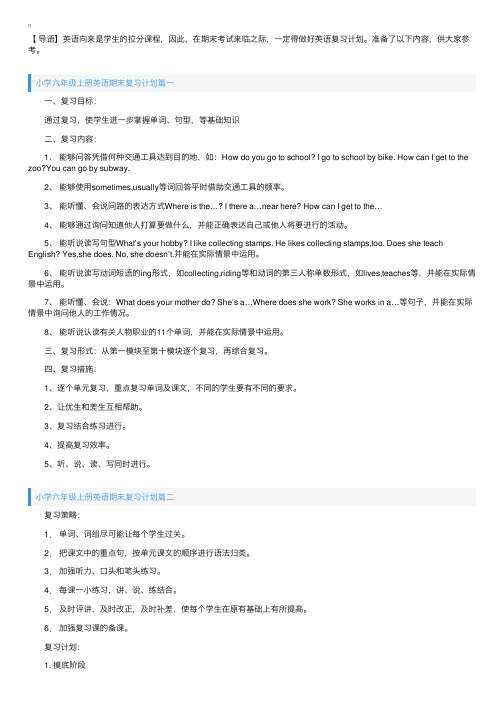
【导语】英语向来是学⽣的拉分课程,因此,在期末考试来临之际,⼀定得做好英语复习计划。
准备了以下内容,供⼤家参考。
⼩学六年级上册英语期末复习计划篇⼀ ⼀、复习⽬标: 通过复习,使学⽣进⼀步掌握单词、句型,等基础知识 ⼆、复习内容: 1、能够问答凭借何种交通⼯具达到⽬的地,如:How do you go to school? I go to school by bike. How can I get to the zoo?You can go by subway. 2、能够使⽤sometimes,usually等词回答平时借助交通⼯具的频率。
3、能听懂、会说问路的表达⽅式Where is the…? I there a…near here? How can I get to the… 4、能够通过询问知道他⼈打算要做什么,并能正确表达⾃⼰或他⼈将要进⾏的活动。
5、能听说读写句型What’s your hobby? I like collecting stamps. He likes collecting stamps,too. Does she teach English? Yes,she does. No, she doesn’t.并能在实际情景中运⽤。
6、能听说读写动词短语的ing形式,如collecting,riding等和动词的第三⼈称单数形式,如lives,teaches等,并能在实际情景中运⽤。
7、能听懂、会说:What does your mother do? She’s a…Where does she work? She works in a…等句⼦,并能在实际情景中询问他⼈的⼯作情况。
8、能听说认读有关⼈物职业的11个单词,并能在实际情景中运⽤。
三、复习形式:从第⼀模块⾄第⼗模块逐个复习,再综合复习。
四、复习措施: 1、逐个单元复习,重点复习单词及课⽂,不同的学⽣要有不同的要求。
期末复习(讲义)译林版英语六年级上册

六年级上册期末复习一、时态复习1.一般现在时定义:经常发生的动作或现在的状态结构:主语+be/主语+动词注意:第三人称单数be动词用is,动词+s/es否定:主语+be+not 或主语+don't/doesn’t+doShe is=She’s He is=He’s I am=I’m We are=We’reis not=isn't are not=aren't am not不能缩写一般疑问句:①有be动词的情况下将be动词提前②动词用助动词do/does提问注意:改为一般疑问句时,第一人称要改为第二人称时间状语:never、seldom、sometimes、usually、often、always例:①My mother often goes shopping.→改为否定句:My mother often doesn't go shopping.→改为一般疑问句:Does your mother often go shopping?②I get up at 7 o'clock every day.→改为否定句:I don't get up at 7 o'clock every day.→改为一般疑问句:Do you get up at 7 o'clock every day?③Millie is a student.→改为否定句:Millie isn't a student.→改为一般疑问句:is Millie a student?2.现在进行时定义:现在正在做或正在发生的动作结构:is/am/are+doing否定:isn't/aren’t/am not+doing时间状语:Look!Listen!now、There be...over there、where is/are sb.?例:③Look!The girl is dancing.→改为否定句:Look!The girl isn’t dancing.②——Where’s mom, Dad?——Maybe she is cooking dinner in the kitchen.3.一般过去时定义:过去某个时间点发生的动作结构:主语+was/were 或主语+动词过去式否定:主语+was not/were not=主语+wasn't/weren’t 或主语+didn't+do 一般疑问句:①有be动词的情况下将be动词提前②动词用助动词did提问注意:改为一般疑问句时,第一人称要改为第二人称时间状语:yesterday、last...、just now、...ago例:③I was ill yesterday.→改为否定句:I wasn't ill yesterday.→改为一般疑问句:Were you ill yesterday?②He went to zoo with his parents last weekend.→改为否定句:He didn't go to zoo with his parents last weekend.→改为一般疑问句:Did he go to zoo with his parents last weekend?4.一般将来时定义:将来的计划或者打算结构:主语+is/am/are going to be或主语+is/am/are going to do否定:isn’t/aren’t/am not going to一般疑问句:be动词直接提前注意:改为一般疑问句时,第一人称要改为第二人称时间状语:next...、tomorrow例:①It is going to be Chinese New Year next week.→改为否定句:It isn’t going to be Chinese New Year next week.→改为一般疑问句:Is it going to be Chinese New Year next week?②I’m going to visit my grandparents tomorrow.→改为否定句:I’m not going to visit my grandparents tomorrow.→改为一般疑问句:Are you going to visit my grandparents tomorrow?二、易错点复习1.询问天气的两种句型:③what is/was the weather like?③How is/was the weather?2.There be句型③就近原则:be动词由后面的第一个名词决定③there be句型不能与have、has、had连用③there be +sb./sth.(即名词或代词)例:There is rain today.=It is rainy today.3.乘坐公共交通③take the/a bus to...=go to ...by bus=go to... on the bus4.home前面不加任何介词例:walk home drive home take a bus home5.will和shall的区别will表示将要,shall表示建议,shall一般用于疑问句表示提议,主语通常是we。
人教版(PEP)六年级英语上册期末复习知识点

人教版(PEP)六年级英语上册期末复习知识点人教版(PEP)六年级英语上册复习知识点Unit 1 How can I get there?主要单词:science科学museum博物馆post office邮局bookstore书店cinema电影院hospital医院crossing十字路口turn转弯left 向左ask问interesting有趣的Italian意大利restaurant餐馆pizza 比萨饼street大街;街道get到达GPS全球卫星定位系统feature特点follow跟着far较远的tell告诉习惯搭配turn left向左转turn right向右转go straight直行in front of...在...前面next to挨着go straight直走near the park在公园附近on Dongfang Street在东方大街上post office邮局pet hospital 宠物医院Beihai Park北海公园Italian restaurant意大利餐馆Palace Museum故宫博物院science museum科学博物馆主要句子:☆1、☆Where is the museum shop?博物馆的市肆在哪儿?☆☆2、It’s near the door.在大门附近。
☆☆3、How can we get there?我们怎么到那儿?☆☆4、Turn left at the bookstore.在书店左转。
☆5、I want to buy a postcard.我想买一张明片。
6、I’ll ask.我去问问。
7、Wow, a talking robot!哇!一个讲话机器人。
8、What a great museum!好棒的一家博物馆!10、There is a pet hospital in my city.在我的城市有一家宠物医院。
11、Wu Yifan and Robin are looking at some robots.吴一凡和罗宾正在看一些机器人。
闽教版小学英语六年级上册期末总复习材料
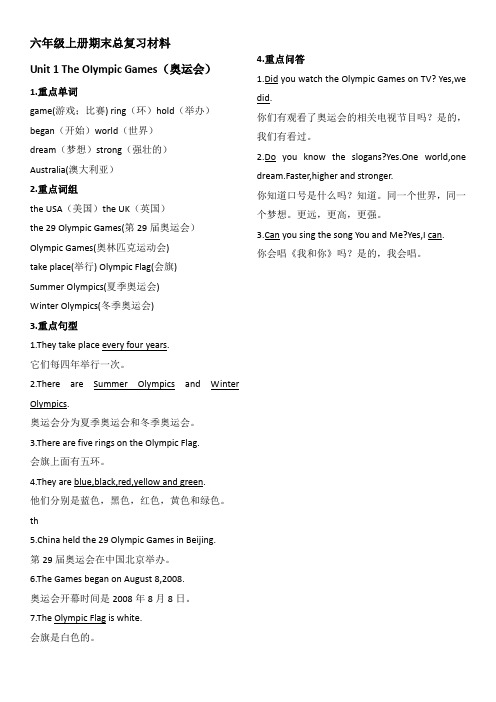
六年级上册期末总复习材料Unit 1 The Olympic Games(奥运会)1.重点单词game(游戏;比赛) ring(环)hold(举办)began(开始)world(世界)dream(梦想)strong(强壮的)Australia(澳大利亚)2.重点词组the USA(美国)the UK(英国)the 29 Olympic Games(第29届奥运会)Olympic Games(奥林匹克运动会)take place(举行) Olympic Flag(会旗)Summer Olympics(夏季奥运会)Winter Olympics(冬季奥运会)3.重点句型1.They take place every four years.它们每四年举行一次。
2.There are Summer Olympics and Winter Olympics.奥运会分为夏季奥运会和冬季奥运会。
3.There are five rings on the Olympic Flag.会旗上面有五环。
4.They are blue,black,red,yellow and green.他们分别是蓝色,黑色,红色,黄色和绿色。
th5.China held the 29 Olympic Games in Beijing.第29届奥运会在中国北京举办。
6.The Games began on August 8,2008.奥运会开幕时间是2008年8月8日。
7.The Olympic Flag is white.会旗是白色的。
4.重点问答1.Did you watch the Olympic Games on TV? Yes,we did.你们有观看了奥运会的相关电视节目吗?是的,我们有看过。
2.Do you know the slogans?Yes.One world,one dream.Faster,higher and stronger.你知道口号是什么吗?知道。
六年级英语上册期末复习资料
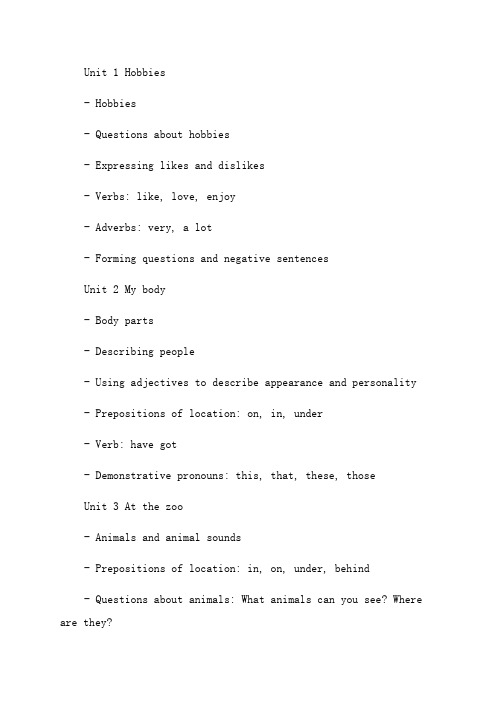
Unit 1 Hobbies- Hobbies- Questions about hobbies- Expressing likes and dislikes- Verbs: like, love, enjoy- Adverbs: very, a lot- Forming questions and negative sentencesUnit 2 My body- Body parts- Describing people- Using adjectives to describe appearance and personality - Prepositions of location: on, in, under- Verb: have got- Demonstrative pronouns: this, that, these, thoseUnit 3 At the zoo- Animals and animal sounds- Prepositions of location: in, on, under, behind- Questions about animals: What animals can you see? Where are they?- Adjectives: big, small, tall, short, long, thin, fat- Singular and plural nouns- Affirmative and negative sentencesUnit 4 At school- School subjects- Classroom objects- Actions: read, write, draw, play, sing, dance, swim, run - Expressing ability: Can you…? Yes, I can. / No, I can’t.- Expressing permission: Can I…? Yes, you can. / No, you can’t.- Ordinal numbers: first, second, third, etc.Unit 5 My house- Rooms in a house- Furniture and household objects- Prepositions of location: in, on, under, behind, next to, in front of- Questions about rooms and furniture: Is there a…? Are there any…?- There is / There are- Adjectives: big, small, old, new, clean, dirtyUnit 6 At the park- Activities at the park: walk, run, play, ride, climb, swing, slide- Prepositions of location: in, on, under, behind, in front of, next to- Questions about activities: What can you do at the park? Where can you…?- Expressing preferences: I prefer… / I don’t like…Unit 7 In the mountains- Geographical features: mountain, river, lake, valley- Activities in the mountains: hike, climb, swim, fish, take photos- Prepositions of location: in, on, under, behind, in front of, next to- Questions about activities: What can you do in the mountains? Where can you…?- Verb: can- Expressing preferences: I prefer… / I don’t like…Unit 8 In Beijing- Places in Beijing: the Great Wall, the Forbidden City, Tiananmen Square- Activities in Beijing: visit, walk, take photos, climb, buy souvenirs- Prepositions of location: in, on, under, behind, in front of, next to- Questions about places and activities: What can you do in Beijing? Where can you…?- Modal verb: can- Expressing preferences: I prefer… / I don’t like…Unit 9 Food and drinks- Food and drinks- Expressing likes and dislikes about food and drinks- Countable and uncountable nouns- Quantifiers: a glass of, a cup of, a bowl of, some- Adjectives: hot, cold, sweet, salty, sour, delicious, tastyUnit 10 Favourite sports- Sport names- Expressing likes and dislikes about sports- Sports equipment- Questions about sports: What sports do you like? What sports can you play?- Verbs: play, do- Expressing abilities: I can… / I can’t…Unit 11 Time for fun- Months and seasons- Expressing likes and dislikes about activities in different seasons- Ordinal numbers: first, second, third, etc.- Adjectives: sunny, cloudy, rainy, snowy, cold, hot, warm, cool- Present simple tense: I read/write/draw…Unit 12 Holidays- Holidays and holiday activities- Questions about holidays: What holiday is in…? What can you do during…?- Adjectives: long, short, fun, boring, interesting- Expressing future plans: I am going to… I will…- Expressing preferences: I prefer… / I don’t like…总结:这个提纲包含了人教版六年级上册所有的重点内容,可以帮助学生复习整个上学期所学的知识点。
六年级英语上册期末复习资料

六年级英语上册期末复习资料Unit 1: My Family- Vocabulary: family members, descriptions- Grammar: possessive pronouns, plural nounsUnit 2: My School Life- Vocabulary: school subjects, activities- Grammar: present continuous tense, question words- Exercises: write about daily routines, answer questions, identify correct answersUnit 3: My Hobbies- Vocabulary: hobbies, sports, musical instruments- Grammar: simple present tense, adverbs of frequencyUnit 4: My City- Vocabulary: places in the city, transportation- Grammar: prepositions of place, imperative sentences- Exercises: describe a city, fill in the blanks with prepositions, give directionsUnit 5: Celebrations- Vocabulary: holidays, traditionsUnit 6: Food and Drink- Vocabulary: fruits, vegetables, meals- Grammar: countable and uncountable nouns, imperatives- Exercises: describe favorite food, fill in the blanks with countable or uncountable nouns, give instructionsUnit 7: The Animal World- Vocabulary: animals, habitats- Grammar: present simple tense, subject-verb agreementUnit 8: Our Environment- Vocabulary: nature, pollution, recycling- Grammar: modal verbs, future tense- Exercises: write about ways to protect the environment, fill in the blanks with modal verbs, choose correct future tenseUnit 9: Travel Adventures- Vocabulary: transportation, countries, landmarks- Grammar: present perfect tense, question formationUnit 10: Health and Fitness- Vocabulary: body parts, healthy habits, sports以上是六年级英语上册期末复习资料的大纲。
六年级英语上册期末复习资料(人教版六年级上英语全册期末复习提纲)

am 只跟I放在一起be动词 is 主语是单数时用are 主语是复数时用Unit 1 询问一些地点在哪;怎样到达一些地点1.询问地点在哪:Where is the 地点Where is the cinema? 电影院在哪?回答: near(附近)next to(旁边)It’s behind(后面) the 地点in front of(前面)It’s near the zoo. 它在动物园附近。
2. 询问怎样到达一个地点:How can I get to the 地点How can I get there/ here ?How can I get to the cinema? 我怎样到达电影院?回答:turn leftturn right at the 地点 go straightTurn right at the zoo. 动物园右转。
Turn left at the zoo, and then go straight, the cinema is on your left.动物园左转然后直走,电影院在你的左边。
或:You can Take the No.57 bus. 你可以乘坐57路公交车。
人 can take the No.数字 busUnit2 到达一些地点的交通方式doesHow do you go to school? 你怎么去学校?回答:人 go(goes) to school by 交通工具I go to school on foot. She goes to school by bus.2.人 must 动词原形人必须……People on bikes must wear one. 骑自行车的人必须戴一个。
I must pay attention to the traffic lights. 我必须注意交通信号灯。
Unit3 人打算做事1.人 be going to do(动词原形) 人打算(或将要)去做事She is going to see a film. 她打算去看电影。
(必考题)小学英语六年级上册期末经典复习题(含答案解析)
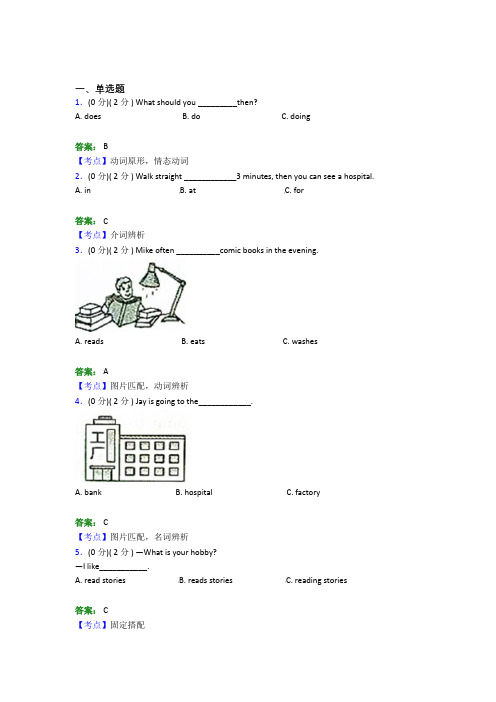
一、单选题1.(0分)( 2分 ) What should you _________then?A. doesB. doC. doing答案: B【考点】动词原形,情态动词2.(0分)( 2分 ) Walk straight ____________3 minutes, then you can see a hospital.A. inB. atC. for答案: C【考点】介词辨析3.(0分)( 2分 ) Mike often __________comic books in the evening.A. readsB. eatsC. washes答案: A【考点】图片匹配,动词辨析4.(0分)( 2分 ) Jay is going to the____________.A. bankB. hospitalC. factory答案: C【考点】图片匹配,名词辨析5.(0分)( 2分 ) —What is your hobby?—I like___________.A. read storiesB. reads storiesC. reading stories答案: C【考点】固定搭配6.(0分)( 2分 ) — ______ does your uncle do?— He's a worker.A. WhatB. WhereC. Which答案: A【考点】疑问词辨析7.(0分)( 2分 ) 你要问路,就要先对对方说:A. Excuse me.B. What can I do for you?答案: A【考点】情景交际8.(0分)( 2分 ) — What is Amy's hobby?— __________________A. I like drawing.B. She likes drawing.C. She lives in Canberra.答案: B【考点】情景交际二、选词填空9.(0分)( 5分 ) 选词填空see, take, wear, do, to(2)My mother is ill. She should ________ a doctor.(3)If you want to stay healthy, you should ________ more exercise.(4)Jim, can you count ________ten?(5)Mike, you should ________ warm clothes.答案:(1)take(2)see(3)do(4)to(5)wear【考点】选词填空10.(0分)( 1分 ) My uncle works ________ (at/in) sea.答案: at【考点】介词短语,介词辨析11.(0分)( 1分 ) My mother often ________ (go/goes) to bed at 9:30 pm.答案: goes【考点】一般现在时12.(0分)( 2分 ) (2020六上·婺城期末)Ben ________ (does/ doing) kung fu every evening. We often ________ (do/ does) kung fu together.答案: does;do【考点】一般现在时13.(0分)( 1分 ) (2020六上·婺城期末)I want ________ (to buy/buy) a postcard.答案: to buy【考点】固定搭配14.(0分)( 2分) (2020六上·婺城期末)—What ________ (do/does) Linda ________ (have/has)?— She has a cute dog.答案: does;have【考点】一般现在时,特殊疑问句15.(0分)( 5分 ) 从方框中选择适当的词语补全下列句子或对话。
六年级英语上册期末复习材料
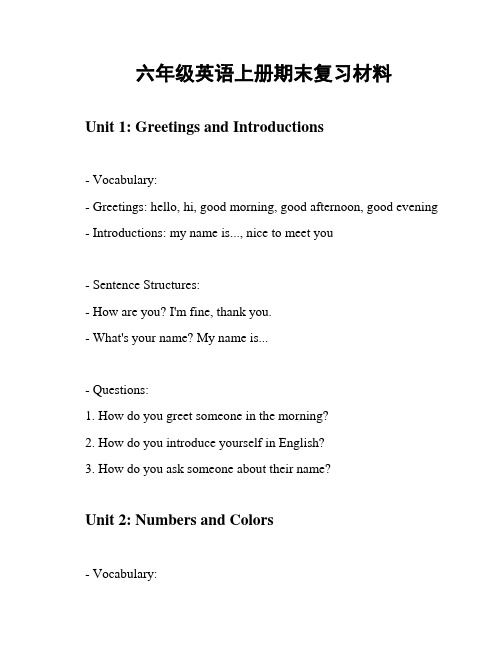
六年级英语上册期末复习材料Unit 1: Greetings and Introductions- Vocabulary:- Greetings: hello, hi, good morning, good afternoon, good evening - Introductions: my name is..., nice to meet you- Sentence Structures:- How are you? I'm fine, thank you.- What's your name? My name is...- Questions:1. How do you greet someone in the morning?2. How do you introduce yourself in English?3. How do you ask someone about their name?Unit 2: Numbers and Colors- Vocabulary:- Numbers: one, two, three, four, five, six, seven, eight, nine, ten - Colors: red, blue, green, yellow, orange, purple- Sentence Structures:- How many...?- The color is...- Questions:1. How do you ask someone about the quantity of something?2. How do you say the color "red" in English?Unit 3: Family and Friends- Vocabulary:- Family: father, mother, brother, sister, grandfather, grandmother - Friends: friend, best friend- Sentence Structures:- This is my...- He/She is my...- Questions:1. How do you introduce your father in English?2. How do you say "best friend" in English?...*Note: This document provides a general overview of the key concepts covered in the sixth grade English textbook. For a more detailed review, please refer to the individual unit materials and exercises.*。
六年级上册英语期末复习
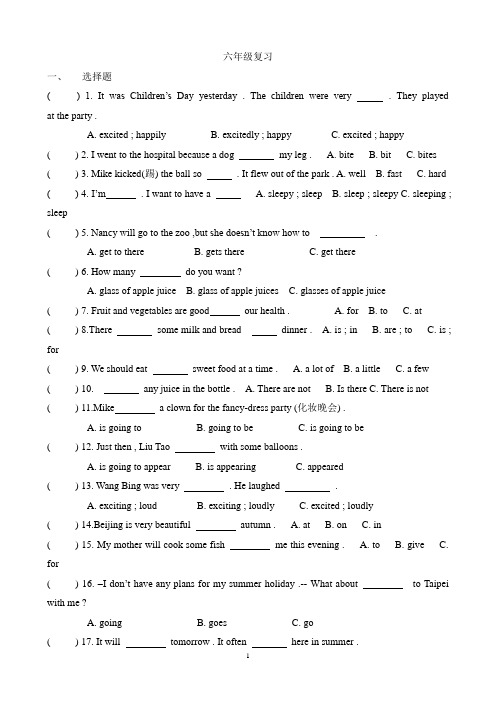
六年级复习一、选择题( ) 1. It was Children’s Day yesterday . The children were very . They played at the party .A. excited ; happilyB. excitedly ; happyC. excited ; happy( ) 2. I went to the hospital because a dog my leg . A. bite B. bit C. bites ( ) 3. Mike kicked(踢) the ball so . It flew out of the park . A. well B. fast C. hard ( ) 4. I’m. I want to have a A. sleepy ; sleep B. sleep ; sleepy C. sleeping ; sleep( ) 5. Nancy will go to the zoo ,but she doesn’t know how to .A. get to thereB. gets thereC. get there( ) 6. How many do you want ?A. glass of apple juiceB. glass of apple juicesC. glasses of apple juice( ) 7. Fruit and vegetables are good our health . A. for B. to C. at ( ) 8.There some milk and bread dinner . A. is ; in B. are ; to C. is ; for( ) 9. We should eat sweet food at a time . A. a lot of B. a little C. a few ( ) 10. any juice in the bottle . A. There are not B. Is there C. There is not ( ) 11.Mike a clown for the fancy-dress party (化妆晚会) .A. is going toB. going to beC. is going to be( ) 12. Just then , Liu Tao with some balloons .A. is going to appearB. is appearingC. appeared( ) 13. Wang Bing was very . He laughed .A. exciting ; loudB. exciting ; loudlyC. excited ; loudly( ) 14.Beijing is very beautiful autumn . A. at B. on C. in( ) 15. My mother will cook some fish me this evening . A. to B. give C. for( ) 16. –I don’t have an y plans for my summer holiday .-- What about to Taipei with me ?A. goingB. goesC. go( ) 17. It will tomorrow . It often here in summer .A. rainy ; rainB. rain ; rainingC. rain ; rains( ) 18. Thank you for to me . A. write B. writing C. to write( ) 19. They are making plans the New Year party. A. at B. with C. for( ) 20. There a fashion show at school next Friday. A. are B. will be C. will ( ) 21. A diet is good for your . A. healthy; healthy B. healthy; health C. health ; healthy( ) 22. Su Hai’s grandmother Kitty’s cat .A. takes care ofB. take care ofC. takes care( ) 23.There a pair of shoes and some balls under the bed just now . A. were B. is C. was( ) 24.The boys are talking about the football match .A. excitedB. excitingC. excitedly( ) 25. it often in Jiangsu? A. Does; rainy B. Is; rainy C. Was , rainy( ) 26. Don’t eat sweet food. That’s bad for our teeth.A. too manyB. much tooC. too much( )27.“How can I go home?” asked the girl . A. loud B. sadly C. sad( )28.The children watched an football match.They were all very .A. exciting, excitingB. excited, excitingC.exciting, excited( )29. our city clean, we should do our best. A. Keep B. Keeps C.To keep( )30.Let the worker a hole in the ground. A. make B. made C. makes( )32. games people happy. A. To play, make B. Playing, make C. Playing, makes( ) 33.---What do you do _____ Chinese New Year’s Eve?--- We usually _____ a big dinner with our family.A. on, have B on, are going to have C. in, had( ) 34. All the children are _______ the party. A .exciting with B excited about C. exciting about()35. Trees help__________ the air clean. A. keep B. to keeping C. keeping ()36. There_____ rubbish in the water and the fish ______dead.A. is; areB. are; isC. are, are( ) 37. The ball is the hole, so Sam pours some water the hole. A. in, in B. into, in C. in, into( )38. Can you tell us how __________ the bus stop. A. to get B. get C. to get to( )39.The man walks , but the woman walks . A.fast, slow B.fast, slowlyC. fastly, slowly( )40.Liu Tao plays basketball ,but Mike does .A. bad, good B. badly, good C. badly, well二、用词的适当形式填空1. Butterflies are ________ (beautiful). They like dancing ____________(beautiful).2.How about (fly) a kite this afternoon?3.Lucy (catch) a bird with her father yesterday morning.4. Su Yang (go) to Japan next Monday . She (want) (find) some information aboutthis country .5. It is a (wind) day . We (fly) kites in the park now .6. It often (rain) here in spring .7. Su Hai is good at (sing) .8. (swim) is good for us . It (make) people (health) and strong .9. Tim knows how to cross the street (safe).10. You mustn’t play on the road . It’s not (safe) .11. Miss Li is talking about traffic (safe).12. Why is the bus (stop) again ?13. Ben is a (happy) boy . He always feels ____ (happy)every day . He always laughs (happy) .14. I _________ ( give ) it to Bob yesterday afternoon.15. ______ you _____ (finish) your homework yesterday?16. All the students are very (excite).17. The mouse is saying (quiet) to the lion.18. Liu Tao (have) some (well) (habit) and he (do) (good) at home.20. Liu Tao_________ (finish) his homework late every day.21. The mouse helped the lion (get) out from the net .22. Don’t shout. Your grandpa (read) newspapers in the study23. Fruit and vegetables are (health) food.24. It’s not ________ (safety) to cross the road now.25. To cross the road ________ (safe), we must look for a zebra ________ (cross).26. To keep ________ (safely), you mustn’t run ________ (quick) on the road.27. It’s too ________ (easily). I can work it out ________ (easy).28. Many __________ (child) run on the playground every day.29. They’re all ________ (drive), they _______ (driver) ________( good).30. Last Sunday, my dad (take) my brother to the KFC, he (become) (happy)31. The boy behind me is _________ (write ) a letter.32. Would you like _________ (listen ) to some music ?33. Look , he can ________ (fly ) a kite on the grass.34. _________ your cousin always like _______ (ask ) a lot about Maths?35. My brother often ________ (play ) football at the weekend.36. I _______ (finish) primary school next year.37. Rubbish _________(make ) the water dirty .38. It’s time _________ (have ) lunch.39. There ________(be) three_______(box) on the table just now.40. Listen! The girl __(play) the piano. She__(play) it every afternoon. But she _ (not play) it yesterday afternoon.41. __________(they)classroom is very messy. 42. We’re going to __________(make) cakes tomorrow.43. Miss Li__________(buy) some flowers last Sunday. 44. We _________(should)throw rubbish anywhere.45. She ________(clean)the desks and _________(put)the rubbish in the bin just now.46..I like . I’d like (swim) with Tim after school.47.The jacket fits me (good). 48. Where’s your mother? She ____________(cut) out a dress.49. My mother often tells me ____________ (not watch) too much TV.50. We should practice ____________ (speak) English more.51. Are you busy __________ (plan) the class trip?52. It takes me about half an hour __________ (run) every day.53. This pair of trousers _________ (look) very nice.54. My cousin with his parents _________ (begin) to eat lunch at 11:30am.55. How long does your mother spends fifteen minutes _________ (walk) to school every morning?56. I have fun __________ (study) English. 57. It’s fun __________ (read) comic books.三、按要求完成句子1. Finally, the lion let the mouse go.(改否定句)2. The woman caught the fish with a net.(对划线部分提问)3. Wang Bing always gets up late.(写同义句)4. Tim eats a lot of sweets every day.(对划线部分提问)5. We usually finish our homework before dinner.(用she 替换we 改写句子)6. A monkey woke the tiger up.(改成一般疑问句)7. Sam brings some water quickly.(改成否定句)8. There are some oranges in the basket.(改成一般疑问句,并作否定回答)9. Jack usually has a few cakes for breakfast.(对画线部分提问)e with me.(改否定句)11.There is much milk in the bottle.(对划线部分提问)12. He has a lot of potatoes. (改一般疑问句,作肯定回答)13. Sometimes he watches TV too.(改同义句)14. Tim has five apples every week.(对划线部分提问)15. They must walk fast now.(改写成否定句)16. We must do your homework before dinner. (对划线部分提问)17. She usually takes some food to the classroom. (用yesterday替换often 改写句子)18. He must not watch TV at night,(提问)19. Helen can play the piano well too. (同义句)20.Does Yang Ling have any good habits?(改为陈述句)21. Where did you visit ? (改为同义句)22. Ben saw some public signs in the restaurant . (改为一般疑问句)23. She had an Art lesson this morning .( 用tomorrow morning 改写句子)24. I was in the playground just now .(改为一般疑问句)25. This sign means “No littering”.(对划线部分提问)26.Liu Tao visited his uncle last week .(对划线部分提问)27. Smoke makes the air dirty. (对划线部分提问)28. Tom takes the metro to his factory every day. (改为同义句)29. He went to the supermarket just now. (否定句)30. They are going to make tangyuan.(对划线部分提问)四、翻译(每空不限词数)1.我们用木头做床、椅子和许多其它东西。
六年级上册英语试题期末专项复习:选词填空 牛津上海版(三起)(含解析)
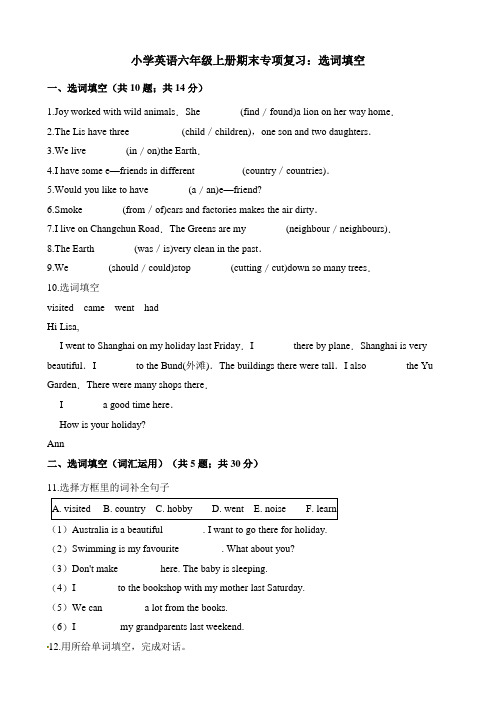
一、选词填空(共10题;共14分)
1.Joy worked with wild animals.She________(find/found)a lion on her way home.
2.The Lis have three ________ (child/children),one son and two daughters.
(4)句意:上周六我和妈妈......了书店。根据句意提示这是短语go to the bookshop“去书店”,根据时间last Saturday,句子时态用一般过去时,谓语动词用过去式,went正确。故答案为:D。
(5)句意:我们可以从书里......许多。根据所给单词和句意,用learn意思正确。故答案为:F。
(5)It keeps them high________ the sky.
(6)We live________ the Earth.The Earth is our home.
(7)What should we do________keep the air clean?
(8)Take a piece________cloth.
我在这里(度过了)一段快乐的时光。
你的假期怎么样?
安
故答案为:(1)went(2)came(3)visited(4)had
【点评】本题考查选词填空,注意短文中句意的合理通顺。
二、选词填空(词汇运用)
11.【答案】(1)B
(2)C
(3)E
(4)D
(5)F
(6)A
【考点】选词填空
【解析】【分析】题目所给单词意思是:A. visited拜访;参观B. country国家C. hobby爱好D. went去E. noise噪音F. learn学习
湖北省宜昌市三峡小学英语六年级上册期末复习试题含答案
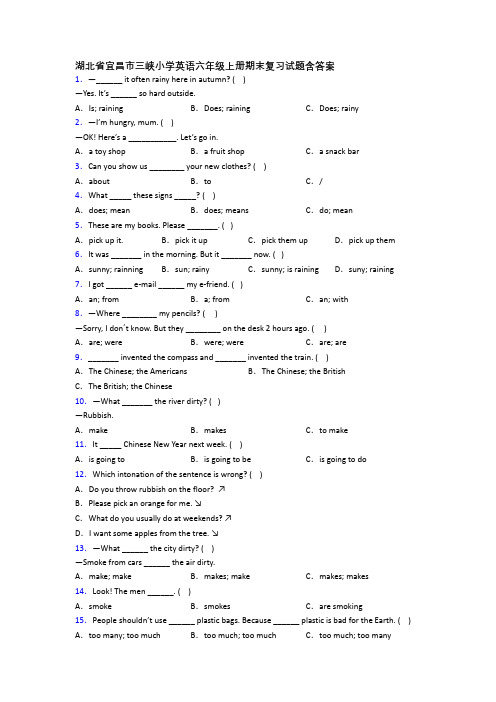
湖北省宜昌市三峡小学英语六年级上册期末复习试题含答案1.—______ it often rainy here in autumn? ( )—Yes. It’s ______ so hard outside.A.Is; raining B.Does; raining C.Does; rainy2.—I’m hungry, mum. ( )—OK! Here’s a ___________. Let’s go in.A.a toy shop B.a fruit shop C.a snack bar3.Can you show us ________ your new clothes? ( )A.about B.to C./4.What _____ these signs _____? ( )A.does; mean B.does; means C.do; mean5.These are my books. Please _______. ( )A.pick up it. B.pick it up C.pick them up D.pick up them 6.It was _______ in the morning. But it _______ now. ( )A.sunny; rainning B.sun; rainy C.sunny; is raining D.suny; raining 7.I got ______ e-mail ______ my e-friend. ( )A.an; from B.a; from C.an; with8.—Where ________ my pencils? ( )—Sorry, I don´t know. But they ________ on the desk 2 hours ago. ( )A.are; were B.were; were C.are; are9._______ invented the compass and _______ invented the train. ( )A.The Chinese; the Americans B.The Chinese; the BritishC.The British; the Chinese10.—What _______ the river dirty? ( )—Rubbish.A.make B.makes C.to make11.It _____ Chinese New Year next week. ( )A.is going to B.is going to be C.is going to do 12.Which intonation of the sentence is wrong? ( )A.Do you throw rubbish on the floor? ↗B.Please pick an orange for me. ↘C.What do you usually do at weekends? ↗D.I want some apples from the tree. ↘13.—What ______ the city dirty? ( )—Smoke from cars ______ the air dirty.A.make; make B.makes; make C.makes; makes 14.Look! The men ______. ( )A.smoke B.smokes C.are smoking 15.People shouldn’t use ______ plastic bags. Because ______ plastic is bad for the Earth. ( ) A.too many; too much B.too much; too much C.too much; too many二、用单词适当形式填空16.There are many _______ (factory) in Xuzhou.17.Mr Liu usually ______ (write) to his friends when he was young.18.Chinese National Day is on ______ (one) of October.19.What holiday _______ (come) after Christmas?20.She _______ (see) a lot of animals in the zoo next weekend.21.He could _______ (fly) a kite three years ago.22.Shenzhou V _______ (fly) into space with Yang Liwei in 2003.23.We _______ (buy) some new clothes tomorrow afternoon.24.We can use water ______ (clean) things in our life.25.—Is it often __________ (rain) in summer there?—Yes, there's a lot of rain.26.I ______ (take) a lot of pictures at the party next week.27.Bobby is ______ (walk) home after school.28.Leo was very ______ (excite) about the football match.29.My grandma usually ______ (tell) me stories when I was a child.30.The sign over there ______ (mean) "No ______ (smoke)".三、完成句子31.Please don’t _______ your drinks ______ the reading room. (把饮料带入阅览室) 32.We can p________ more trees in our school.33.There is not ______ (许多石油) on Earth.34.I’m hungry, I want to buy some _______ (食物).35.Many years ago, Mike’ s grandpa r______ newspaper.36.—Don't litter your banana skin on the ground. ___________ it ___________ (捡起来)! —OK, sorry!37.Helen didn’t go to school _______ (昨天).38.We can`t _____ (步行去学校). It`s _____ (有风且有雨的) tomorrow.39.The Earth is our home. We should p_______ it.40.Children are very e_______ on Children's Day.四、完形填空41.My father, Yang Liwei, is a taikonaut, and he is very famous. _41__ October 2003, my father_42__ into space in Shenzhou V. He _43__ about twenty-one hours in space. He _44__ a lot of work there. He also _45__ a video in space. Then he _46__ back to the earth. My mother and I went to the airport _47__ my father. We were very happy. It was a great day! I was very proud _48__ him. Now he still _49__ me about his space travel. I want to go _50__ space someday too.41、A.On B.In C.At42、A.flew B.fly C.flies43、A.spend B.spent C.spends44、A.do B.does C.did45、A.made B.make C.makes46、A.come B.comes C.came47、A.meet B.to meet C.met48、A.on B.at C.of49、A.tells B.telling C.told50、A.in B.into C.to五、阅读判断42.One afternoon just before Christmas, an old man sees a little boy in the street. The boy sits on the ground and cries sadly. “Why are you crying?” asks the man. “I lost a ten-penny piece(十便士硬币),” says the boy. The old man gives a new ten-penny piece to him. “Thank you very much,” says the little boy.About an hour later, the old man walks backs home on the same streets. He sees the little boy sitting in the same place and still cries sadly. He goes up to the boy and asks, “Did you lose the ten-penny piece again?” “No,” says the boy. “If I could find my piece, I would have twenty pennies now.”41、The story happens on Christmas Day. ( )42、The boy can’t find his ten-penny piece, so he cries. ( )43、The boy lost the ten-penny piece two times that day. ( )44、The boy is waiting for the old man. ( )45、The boy has twenty pennies now. ( )六、阅读理解43.People around the world celebrate New Year’s Eve. Let’s have a look.Sydney, AustraliaThe city is famous for its fireworks show. The fireworks are bright and beautiful and they make the dark sky very bright.Paris, FranceLots of people get together around the Eiffel Tower. People can see fireworks over there. Madrid, SpainThe Sp anish people eat 12 grapes on New Year’s Eve. Every grape stands for one month of the year. They believe this will bring them good luck for the coming year.Beijing, ChinaPeople usually spend New Year’s Eve with their family. They usually have a wonderfu l dinner. People often say “Happy New Year” to each other.51、How many countries are mentioned in the passage? ( )A.Three. B.Four. C.Five. D.Six.52、Sydney is famous for ________. ( )A.its sea B.its fireworks show C.its food D.its tower53、What kind of fruit do the Spanish people eat on New Year’s Eve?A.Apples. B.Pears. C.Bananas. D.Grapes.54、Which of the following is NOT true according to the passage? ( )A.In France, people get together around the Eiffel Tower on New Year’s Eve.B.Every grape stands for one month of the year in Spain.C.Chinese people usually spend New Year’s Eve with their friends.D.People in Australia can see beautiful fireworks.55、What’s the best title of the passage? ( )A.Different Ways to Celebrate New Year’s Eve B.Diff erent Food on New Year’s Eve C.Different Countries and Their Festivals D.Different Countries and Their Capitals七、选择题44.John likes chocolates very much, but his mother doesn’t give them to him. They’re bad for(对……不好) his teeth, she thinks. But John has a very nice grandfather. The old man loves John very much and sometimes he buys John some chocolates. Then John’s mother lets him eat them, because she wants to make the old man happy.This Sunday is John’s seventh birthday. On Saturday evening, John says, “Please, God(上帝), give me a big box of chocolates for my birthday.” His mother says, “God can’t hear(听见) you. Don’t shout(喊).”“I know,” says the boy with a smile(微笑), “but grandfather is in the next room, and he can.”56、John’s mother thinks _______. ()A.John’s teeth are bad B.chocolates are good for teethC.John’s teeth are good D.chocolates are bad for John’s teeth57、Why does John’s mother let him eat chocolates sometimes? ()A.Because John’s grandfather buys some chocolates for him.B.Because she is happy. C.Because she wants to make John’s grandfather happy.D.Because she thinks it’s not bad to eat some chocolates sometimes.58、What day is John’s seventh birthday? ()A.This Saturday. B.This Sunday. C.Next Friday. D.Next Monday.59、John shouts to _______. ()A.make his grandfather hear him B.make God hear himC.make his mother hear him D.eat some chocolates60、Which one is TRUE? ()A.John’s grandfather is God.B.John’s mother buys John some chocolates. C.John may get a big box of chocolates for his birthday. D.John can get chocolates from God.八、选择题45.Hello! My name is Bill. I am eleven. I like travelling. I want to tell you my travel plan. I want to go to Henan with my parents this summer vacation (暑假). We want to go there by train. I want togo to Shaolin Temple (寺) and learn kung fu there. My father wants to climb the mountains. He thinks it’s great. My mother wants to draw pictures. She thinks it’s exciting. I think we will have fun there.61、Bill likes ________. ( )A.singing B.travelling C.reading62、Bill wants to go to Henan with his ________. ( )A.classmates B.parents C.friends63、They want to go to Henan ________. ( )A.by train B.by plane C.by bus64、Who wants to learn kung fu? ( )A.Bill’s father.B.Bill. C.Bill’s mother.65、Bill’s father wants to ________ there. ( )A.draw pictures B.study Chinese C.climb the mountains九、选择题46.Penny lived on a farm. She was called the “silly goose”(愚蠢的鹅) because she often did some foolish things. She didn’t like the name. One day, she fou nd a book on the grass. She was very happy. She took the book with her everywhere. She felt herself so clever and became proud(得意的). The animals thought Penny became clever now because she always carried a book. So they asked her for help. But Penny always gave the wrong ideas. One day, a pig picked a lot of mushrooms and went home happily. He asked Penny for help. Penny said“You can eat them. They are very nice.”But the mushrooms are poisonous(有毒的). The animals were sick and angry. They couldn’t believe Pe nny. So Penny lost her pride(骄傲). She knew that it was useless(无用的) to have a book. She should work hard and she began to read books every day.66、—Where did Penny live? ( )—_______A.She lived on the grass. B.She lived on a farm.C.She lived at school.67、—Why was she called the “silly goose”? ( )—_______A.Because she was clever. B.Because she lived on a farm. C.Because she often did some foolish things68、—Was she happy when she found a book on the grass? ( )—______A.Yes, she was. B.No, she wasn’t.C.Yes, she did.69、Penny’s ideas are _______ for the animals. ( )A.good B.useful C.useless70、—What do we know from the story? ( )—______A.Penny began to work hard. B.Penny is very clever.C.Other animals liked reading books.47.A dog gets a nice, big piece of meat(肉) from a woman. He has it in his mouth happily. He wants to go home for supper. His home is on the other side of the river. There is a bridge(桥) over it. He goes on it and has a look at the water. He sees a dog looking at him and he has a piece of meat in the mouth, too. And the meat looks bigger. “His meat is bigger and nicer than mine. I must get it.” he thinks. So he opens his mouth and shouts at the dog in the water. Before he knows, his meat falls into the water.66、What does the dog get? ( )A.A fish. B.A piece of meat. C.Some cakes. D.Some bread.67、Where is the dog's home? ( )A.In a woman's house. B.On the other side of the river.C.On the bridge. D.In the water.68、What does the dog do on the bridge? ( )A.He talks to the dog in the water. B.He looks for something to eat.C.He looks for something to drink. D.He looks at the dog in the water and wants to get his meat.69、What's in the water? ( )A.A dog. B.A piece of meat. C.A bridge. D.Both A and B.70、How many pieces of meat does the dog get at last(最后)? ( )A.0. B.1、C.2、D.3、【参考答案】湖北省宜昌市三峡小学英语六年级上册期末复习试题含答案1.A解析:A【详解】—在秋天这个经常下雨吗?—是的,外面正在下大雨。
六年级英语上册期末复习宝典(1)
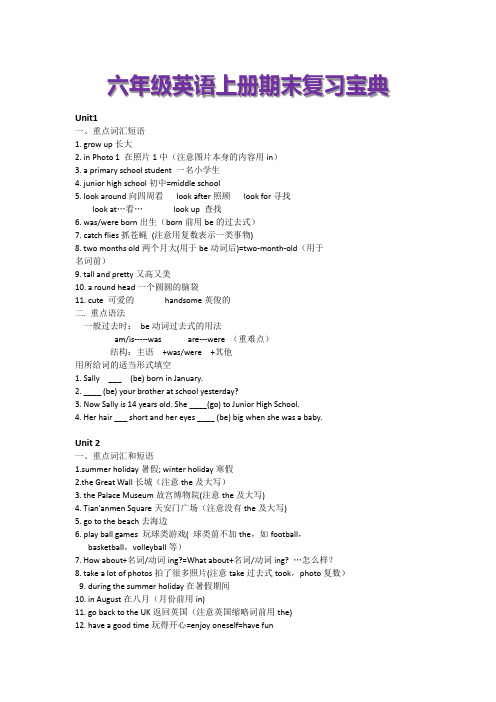
六年级英语上册期末复习宝典Unit1一、重点词汇短语1. grow up长大2. in Photo 1 在照片1中(注意图片本身的内容用in)3. a primary school student 一名小学生4. junior high school初中=middle school5. look around向四周看look after照顾look for寻找look at…看…look up 查找6. was/were born出生(born前用be的过去式)7. catch flies抓苍蝇(注意用复数表示一类事物)8. two months old两个月大(用于be动词后)=two-month-old(用于名词前)9. tall and pretty又高又美10. a round head一个圆圆的脑袋11. cute 可爱的handsome英俊的二. 重点语法一般过去时:be动词过去式的用法am/is-----was are---were (重难点)结构:主语+was/were +其他用所给词的适当形式填空1. Sally ___ (be) born in January.2. ____ (be) your brother at school yesterday?3. Now Sally is 14 years old. She ____(go) to Junior High School.4. Her hair ___ short and her eyes ____ (be) big when she was a baby.Unit 2一、重点词汇和短语1.summer holiday暑假; winter holiday寒假2.the Great Wall长城(注意the及大写)3. the Palace Museum故宫博物院(注意the及大写)4. Tian'anmen Square天安门广场(注意没有the及大写)5. go to the beach去海边6. play ball games 玩球类游戏( 球类前不加the,如football,basketball,volleyball等)7. How about+名词/动词ing?=What about+名词/动词ing? …怎么样?8. take a lot of photos拍了很多照片(注意take过去式took,photo复数)9. during the summer holiday在暑假期间10. in August在八月(月份前用in)11. go back to the UK返回英国(注意英国缩略词前用the)12. have a good time玩得开心=enjoy oneself=have fun13. stay with sb.跟某人待在一起14. in the countryside在乡村15. last Sunday上周日(last...是一般过去时标志)16. How is...? …怎么样?二. 重点语法一般过去时:含有be 动词的一般疑问句,否定句和特殊疑问句am/is-----was are---were (重难点)结构:Was/Were +主语+其他?主语+was/were not+其他.特殊疑问词+一般疑问句?三、习题1.I was a baby ten years ago.(变为否定句)2.My friends were at home yesterday.(变为一般疑问句)3.They were students 2 years ago.(变为否定句)4.We were happy the day before yeaterday.(变为一般疑问句,并做肯定回答和否定回答)Unit3一、词汇短语1. this morning今天早上(一般是过去时标志)2. two hamburgers两个汉堡3. some cola一些可乐4. --What did you have for breakfast?(注意介词for)--I had…for breakfast.5. should应该,情态动词,后加动词原形6. have a little meat / sweet food 吃一点肉/甜食(注意a little修饰不可数名词)7. have too much meat吃太多肉(注意too much修饰不可数名词)8. have breakfast 吃早餐9. healthy ---unhealthy (un否定前缀=not)10. strong and healthy 健康又强壮11. play sports 做运动12. fat and unhealthy 又胖又不健康13. have poor/good eating habits 有不好/好的饮食习惯14. fish and chips 炸鱼薯条15. in the UK 在英国16. 可数:hamburger; vegetable; egg; pie; sandwich; noodle;不可数: cola; fruit; meat; bread; milk; pizza; rice; fish;chicken; sweet food; candy; ice-cream; chocolate;17.肯:I had breakfast this morning.否:I didn’t have breakfast this morning.一般疑问句:Did you have breakfast this morning?肯定/否定回答:Yes, I did./ No, I didn’t.二. 重点语法一般过去时:含有实意动词的动词过去式:直去双改特殊记结构:主语+V过去式+其他Did+主语+V原+其他?特殊疑问词+一般疑问句?三、习题1. Tom can have a little meat, but not _______.A. too manyB. many tooC. too muchD. much too2. What did you have____ lunch yesterday.A. onB. atC. inD. for3. We________(should/should not) have breakfast.4. Judy ate some fish.(对划线部分提问)_____________________________________________5. They took a lot of pictures in the Palace Museum.(变否定句)1-3单元复习1.In the photo, Alice in London. She had a good time there.A. isB. wasC. went2. Jim stayed with his sister in Beijing the winter holiday.A.onB. atC. during3. How your weekend? Where you go?A.did, wasB. was, didC. were, did4. The frog in the river.A.bornB. is bornC. was born5. Don’t drink coffee. It’s not healthy.A.too muchB. much tooC. so many6. Joe is eight years old now. He goes to .A. primary schoolB. middle schoolC. junior high school按要求改写下列句子:1.Tom was born in 2011. (对画线部分进行提问)?2. They spent their holiday in London. (对画线部分进行提问)?3. Lily and Ben saw an old friend yesterday. (变为否定句)?答案:选择:1-6 BCBCAA句型: 1. When was Tom born?2. Where did they spend their holiday?3. Lily and Ben didn’t see an friends yesterday.Unit41. last weekend上周末2. play with...和...玩(play with Tom/fire)3. the Greens(格林一家)the+姓氏的复数表一家人4. the US=the USA=America美国5. play chess下棋6. in my home在我家(in表示在房子范围内,at表示在家这地点)7. the UK英国8. play table tennis=play ping-pong ball打乒乓球9. be from=come from来自10. in the forest在森林11. in the tree落在树上on the tree长在树上12. make a lot of noise制造很多噪音13. stop doing sth.停止干什么14. dig a hole挖一个洞15. have a good sleep睡个好觉16. talk to sb.跟某人说话17. say hello to sb.跟某人打招呼18. know...well很了解......本单元重点句型:1.学会用Did you…?询问对方过去是否做了某事?2.学会Yes, I did./ No, I didn’t.做肯定或否定回答习题1. —Where ____ you last weekend?—I ____ at school.A. were; wereB. were; wasC. was; wereD. was; was2. kitty ____her room yesterday.A. cleanB. cleansC. cleanedD. cleaning3. Ben _____ a good sleep last night.A. haveB. hadC. hasD. having4. Please stop noise in class.A.makesB. makingC. made5. do many rabbits sleep? –In hole.A.WhatB. HowC. Where6. – Did the rabbits a hole?– Yes, they a hole yesterday.A. dig, digB. dug, digC. dig, dug选择题的答案:1-6: BCBBCC句型题-连词成句1.see, you, did, them, morning, this(?)?2. your, who, neighbours, are(?)?3. many, today, sleep, rabbits, holes, in(.). 句型题的答案:1.Did you see them this morning?2.Who are your neighbours?3.Today many rabbits sleep in holes.Unit51. in danger 处于危险中2. in the past 在过去(一般过去时的时间标志)3. in the wild 在野生环境中4. South China tigers 华南虎5. blue whale 蓝鲸6. six hundred 六百(区别:hundreds of)7. on one‘s way home 在某人回家的路上on one’s way to school 在某人去学校的路上8. take care of=look after 照顾9. go for a walk 去散步10. drive...away 把...赶走11. grow up 长大12. learn a lot 学到很多(区别:a lot of +名词)13. send (sent)...back to ... 把...送回到...14. three years later三年后(整篇文章是过去时,则用于过去时)15. be happy to do sth. 很高兴做某事...16. help them all 帮助他们所有人17. in the jungle 在丛林中18. oo发音:k,d之前oo短,food foot恰相反19. What can we do to help them? 我们能帮助他们做些什么?本单元重点句型:学会用in the past, there were…句型描述某种事物过去的数量。
六年级上册期末英语综合复习
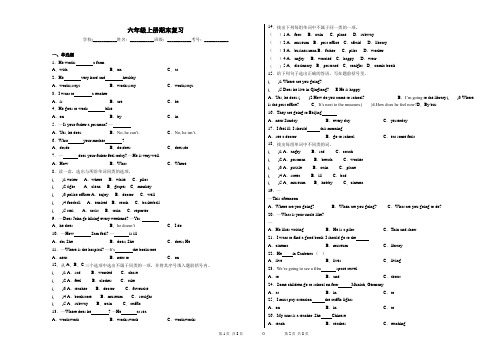
六年级上册期末复习学校:___________姓名:___________班级:___________考号:___________一、单选题1.He works a farm.A.with B.on C.at2.He very hard and healthy.A.works;stays B.works;stay C.work;stays3.I want to a teacher.A.is B.are C.be4.He goes to work bike.A.on B.by C.in5.—Is your father a postman? —A.Yes, he does. B.No, he can’t.C.No, he isn’t.6.What your mother ?A.do;do B.do;does C.does;do7.—does your father feel today? —He is very well.A.How B.What C.Where8.读一读,选出与所给单词同类的选项。
( )1.writer A.where B.white C.pilot( )2.tiger A.clean B.grapes C.monkey( )3.police officer A.enjoy B.doctor C.well( )4.football A.excited B.teach C.basketball( )5.taxi A.artist B.train C.reporter9.—Does John go hiking every weekend? —Yes, .A.he does B.he doesn’t C.I do10.—How Sam feel? —is ill.A.do; She B.does; She C.does; He11.—Where is the hospital? —It’s the bookstore.A.next B.next to C.on12.从A、B、C三个选项中选出不属于同类的一项,并将其序号填入题前括号内。
- 1、下载文档前请自行甄别文档内容的完整性,平台不提供额外的编辑、内容补充、找答案等附加服务。
- 2、"仅部分预览"的文档,不可在线预览部分如存在完整性等问题,可反馈申请退款(可完整预览的文档不适用该条件!)。
- 3、如文档侵犯您的权益,请联系客服反馈,我们会尽快为您处理(人工客服工作时间:9:00-18:30)。
一、选择题。
( ) 1. My mother went , but my father .
A. fishing; wasn’t
B. fish; doesn’t
C. fishing; didn’t
D. fish; didn’t
( ) 2. ---it rainy last night? ---Yes. It heavily.
A. Did; rainy
B. Was; rained
C. Did; rained
D. Was; rainy
( ) 3. ---What do you do _______ Christmas Day? --- We usually _________ a big lunch with our family.
A.on, have B on, are going to have C. in, had D. at, having
) 5. We shouldn’t drive and use plastic bags.
A. too much; too many
B. too many; too much
C. too much; too much
D. too many; too many
( ) 10. What ______ you feel angry? A. make B. makes C. making
( ) 11. We shouldn’t drive or use plastic bags.
A. too much; too many
B. too many; too much
C. too much; too much
D. too many; too many () 12. —— Why swim in the river? —— Can’t you see the sign ‘No swimming’ there?
A. can we
B. should we
C. cann’t we
D. we shouldn’t.
二、用所给词的适当形式填空。
1.Do you know how (protect) the Earth.
2. All the students were about the football game (excite).
3. Water is (use)for us. We use water (wash) clothes.
4.A pair of glasses (be) on the desk yesterday
5. What can we do (keep) our country beautiful?
6.Yang Ling (wait) for the bus now.
7.I would like (be) your friend.
8.Who (make) our streets clean every morning?
9. It is always ___________ (rain) in spring here.
10. We shouldn’t waste too ___________ (many) wood.
三、按要求改写句子。
1.I did my homework last night. (改为一般疑问句)
my homework last night?
2.People should save energy because there’s not much energy(对划线部分提问)
people save energy ?
3.We should not shout in the hospital .(对画线部分提问)
we in the hospital ?
5. Liu Tao visited his uncle last week .(对划线部分提问)
_______ _______ Liu Tao ______ last week ?
6. much, on, there, not, is, Earth, coal (.) (连词成句)
四、根据中文提示完成句子。
1. All students should know (如何保护地球).
2. Most of the energy coal and oil(来自煤炭和石油).
3. I can (再利用塑料瓶子)to make a toy.
4.Drinking too much (对我们的健康有害).
5.Mum, can you __________________________ (讲个有趣的故事) to me?
6. __________________________________ (保持图书馆干净),don’t eat or drink here.
7.To protect the Earth, we shouldn’t ___________________________ (频繁开车).。
